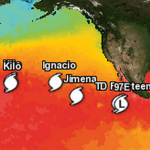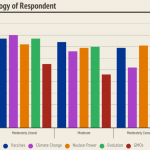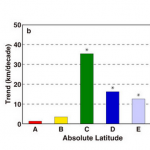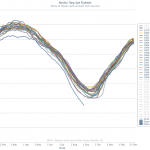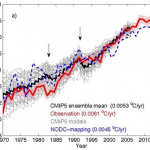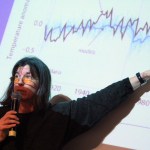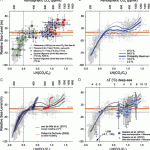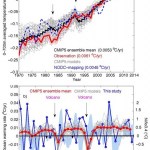Global Warming
Marine biologists from the University of Queensland is looking at coral reefs in Hawaii and what they see is not good.
They used high resolution images to track coral bleaching and death. Recently coral reefs in Hawaii suffered their first known mass bleaching event, caused by unusually warm waters associated with the now famous "Blob" of warm sea water in the Pacific.
An overall warming trend (anthropogenic global warming) along with the additional effects of a growing El Niño seem to be causing this.
This phenomenon is happening now. Ove Hoegh-Guldberg, chief scientist at Global Change…
The Citi Global Perspectives and Solutions thingie, part of Citibank, has done a study that you can read here. It says that addressing global warming makes economic sense. So, when those science deniers are out there denying climate change they are also denying arithmetic. Shame on them.
Dana Nuccitelli, author of Climatology versus Pseudoscience and Guardian Blogger, wrote up the report at Skeptical Science:
Citi Global Perspectives & Solutions (GPS), a division within Citibank (America’s third-largest bank), recently published a report looking at the economic costs and benefits of a…
Not the book (which is good) but the thing. The storms, really.
I may have mentioned the pilot whales I saw in San Diego the other day. You've heard about changes in shark distributions, and odd fish being caught in unusual places, etc. This is all about changes in the Pacific as increased global warming affects ocean ecology. Inside Climate News has this:
A
Warmer North Pacific Is Staying Warmer, With Dramatic Impact on Marine Life
Ocean temperature fluctuations have slowed, a new study says, with an extended warm period in the N. Pacific causing a massive shift in marine life.
One study…
Two items of interest.
1) A new poll looks at conservative and liberal views of science. The findings are not especially unexpected, but the details are interesting. The image above is from this infographic, and the details are given here.
Yes, the detail are quite interesting.
2) If you care, there is some information on what the 2016 GOP candidates stand on climate change.
This is put together by CBS and is here.
Human caused climate change is changing the size and location of major climate zones, according to a new study.
Climate is complex, and a classic, widely used effort to wrangle that complexity into a sensible form is the Köppen classification system (and variants). We need not speak of the details here, but within this scheme there are five climate groups that include all of the possibilities for the Earth’s land surface. They are:
A: Tropical/megathermal climates
B: Dry (arid and semiarid) climates
C: Temperate/mesothermal climates
D: Continental/microthermal climates
E: Polar and alpine…
John Abraham is a scientist at St Thomas University in the Twin Cities. John is famous for doing battle with a famous science denialist (that's what the meme above refers to), for his blog at the Guardian, for his research in several areas such as ocean heat, and for keeping track of month by month increases in global surface heat caused by anthropogenic global warming.
Sunday, I had the honor of interviewing John Abraham about current developments in climate change. It was Sunday morning so you were probably either sleeping or in church, but don't worry, there's a podcast!
You can listen…
I don't care that the director or CEO of an advocacy organization concerned with poverty is an active academic. Indeed, my view of active academics is that many are largely incompetent in areas of life other than their specialized field. If that. So really, if you told me there is this great advocacy organization out there run by a well established active academic I'd figure you had that wrong, or I'd worry a little about the organization. On the other hand, everyone should care that university positions be given to active academics with credentials. So, when the University of Western…
Just a few pointers to some of today's interesting climate stories.
First, this is the tenth anniversary of Hurricane Katrina. After ten years, the costs of that hurricane are still being paid. See this overview. Also, astonishingly, or perhaps totally expectedly, one third of Louisiana blame a Democratic Senator from the Midwest for the lousy response to Katrina by the Republican executive branch.
Meanwhile, wildfires out west are really bad. A friend of mine drove way into the rocky mountains over the last few days and noted that for a long time he couldn't even see any mountains the…
A new paper examines what is behind the ~2% of climate change related peer reviewed research that run contrary to widely accepted scientific consensus on climate change to see why those papers are wrong.
There is a scientific consensus that increasing greenhouse gas concentration in the atmosphere causes surface warming, and that CO2 is a major greenhouse gas. This consensus is based on physics. We don't need to observe the effects of human greenhouse gas pollution to know this. There is consensus that human burning of fossil fuel causes an increase in CO2 in the atmosphere. We don't need…
What's worse than months or years without rain? Rain, after months or years, at least under some circumstances.
For instance ... it gets try, plants become vulnerable to fire. Fires happen denuding the dry landscape. Then it rains, and you get more severe floods together with landslides. You know the story because for years this has been the pattern in California.
But there is another roughly similar, or at least analogous, problem that is now being discussed. The levees that are mean to keep floodwaters contained in California were already in fairly bad shape. Prior to the drought, a…
We need to act urgently to reduce the amount of greenhouse gas pollution we humans create in order to slow down and eventually stop climate change. In the mean time we see case after case of something happening that seems unusual and that seems linked to global warming. We need not wait for the jury to return a verdict in every single case in order to act. We already know what many of the effects of climate change are, and we have a reasonably good idea of what effects will arise in the future. Even so, every now and then something happens that any reasonable person might guess is linked…
How do you explain a person seemingly legitimately trained in science drifting off and becoming more and more of a science denier?
In the case of Judith Curry I was unwilling to think of her as a full on science denier for a long time because her transition into denierhood seemed to be going very slowly, methodologically. It was almost like she was trying to drift over into denier land and maybe bring a few back with her. Like some people seem to do sometimes. But no, she just kept providing more and more evidence that she does not accept climate science's concensus that global warming is…
This is F@k1n' brilliant.
Cherry-pickin’ a bit of temperature data
And tryin’ to claim that climate change is in hiatus
It’s not, the trends are still going straight up
But they ain’t tryin’ to change their minds once they’re made up
In 1992 my mama’s thesis
Was about CO2 and Svante Arrhenius
So if you try to tell me that climate change isn’t serious
You’re dissin’ my mama, yup I’m kinda cliquish
Also by Baba Brinkman:
The Rap Guide to Religion
The Rap Guide to Evolution
The Rap Guide to Evolution: Revised [Explicit]
The Rap Canterbury Tales
The Rap Guide to Wilderness
The Rap Guide to…
Climate Models Accurately Predict Warming
Climate models employ piles of data and sophisticated computational techniques to predict what will happen in the future. Sometimes they predict what happened in the past as well. That is important to test the models (because we might know what happened in the past), or to fill in the blanks (we don’t always know exactly what happened in the past) or to understand complex climate systems better.
If you glance at the science denier rhetoric (mainly on blogs, you won’t find much in the peer reviewed literature because it isn’t good science) you’ll see…
Bill Maher and Penn State meteorology professor Michael Mann discuss the “settled science” of climate change and the lack of public engagement on the issue. Dr. Mann is the co-author of "Dire Predictions: Understanding Climate Change.”
There are two new scientific research papers looking at variation over the last century or so in global warming. One paper looks at the march of annual estimates of global surface temperature (air over the land plus sea surface, not ocean), and applies a well established statistical technique to ask the question: Was there a pause in global warming some time over the last couple of decades, as claimed by some?
The answer is, no, there wasn’t.
The paper is open access, is very clearly written so it speaks for itself, and is available here. One of the authors has a blog post here, in German…
Men and women are different, on average, in a number of ways. It all probably starts with who has the physiology to have babies and who doesn't, and the differences spread out from there, affecting both the body and the mind. Decades of research show us that many of the body differences (but not all) are determined by developmental processes while many of the mind differences (but maybe not all) are determined by culture, but culture still has men and women as being different, so those differences tend to be persistent and predictable, on average.
One of the differences which seems to…
I did an interview with JD Goodwin at at Blue Streak Science. It is here. Great science podcast, check out their other items.
Here is the interview on iTunes.
What is not new
Ultimately sea levels will rise several feet, given the present levels of CO2 in the atmosphere. We already knew this by examining paleo data, and finding periods in the past with similar surface temperatures and/or similar atmospheric CO2 levels as today.
I put a graphic from a paper by Gavin Foster and Eelco Rohling at the top of the post. It does a good job of summarizing the paleo data.
If we keep pumping CO2 into the atmosphere at current, or even somewhat reduced, levels for a few more decades, the ultimate increase in sea levels will be significant. Find the 400–500…
Every month NASA GISS comes out with the new data for the prior month's global surface temperature, and I generally grab that data set and make a graph or two. In a way this is a futile effort because the actual global surface temperature month by month is not as important as the long term trend. But at the same time it is a worthy exercise because it is news, and especially lately, we seem to be breaking records of one kind or another every month.
This month I was out of town and actually traveling sans computer, when the NASA GISS data became available. So, for me to produce the graphs…


